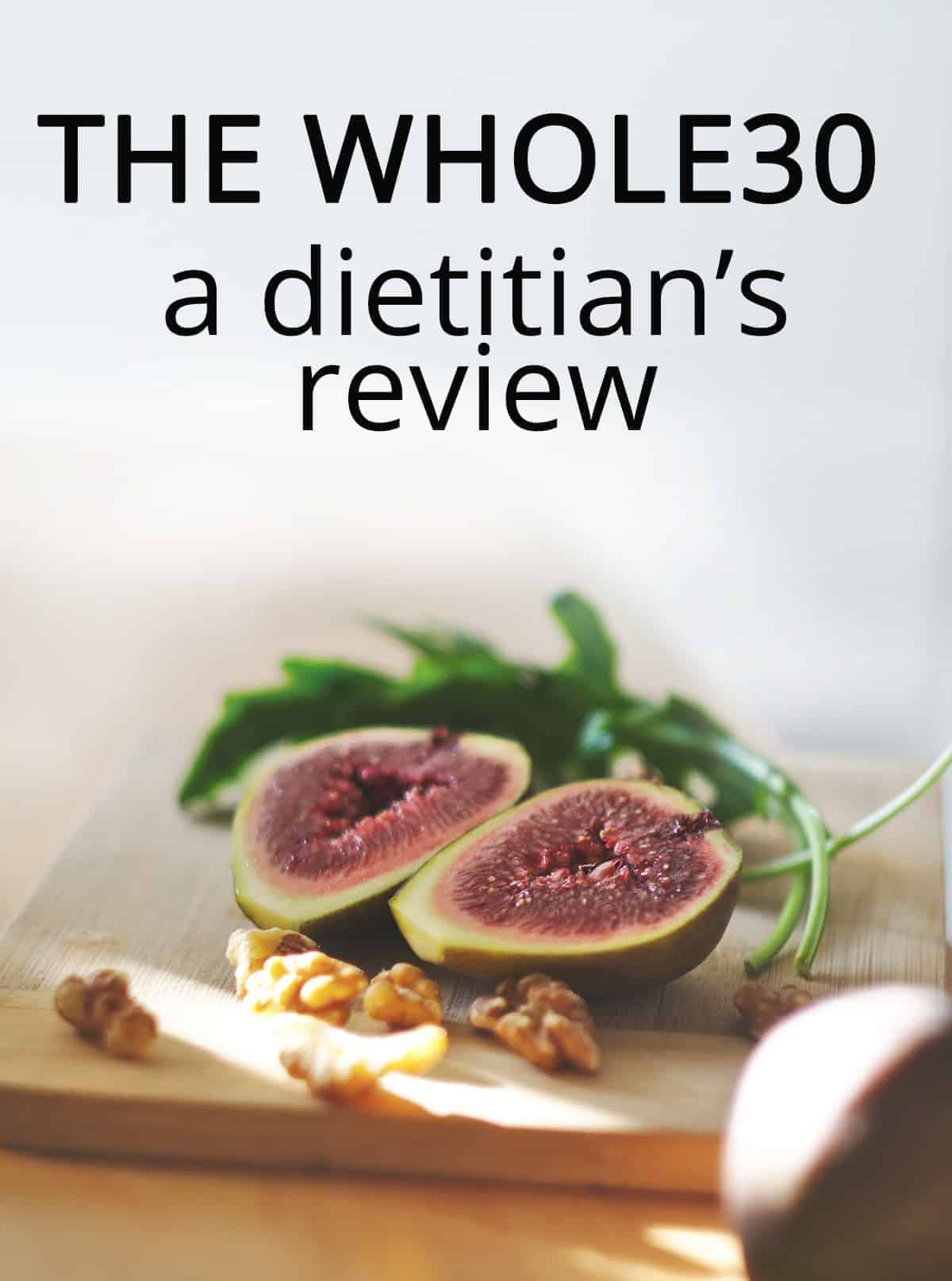
I get asked about the Whole 30 diet on a regular basis. I guess it’s pretty popular?
About time I let you know what this dietitian thinks!
what is the whole 30?
Founders Melissa and Dallas Hartwig have put together a strict elimination diet that you’re supposed to follow for 30 days. And when I say strict, I mean strict. They even go so far as to say “Don’t even consider the possibility of a “slip.” If you accidentally eat something on the “avoid” list, you’re required to restart back at day one. Ouch.
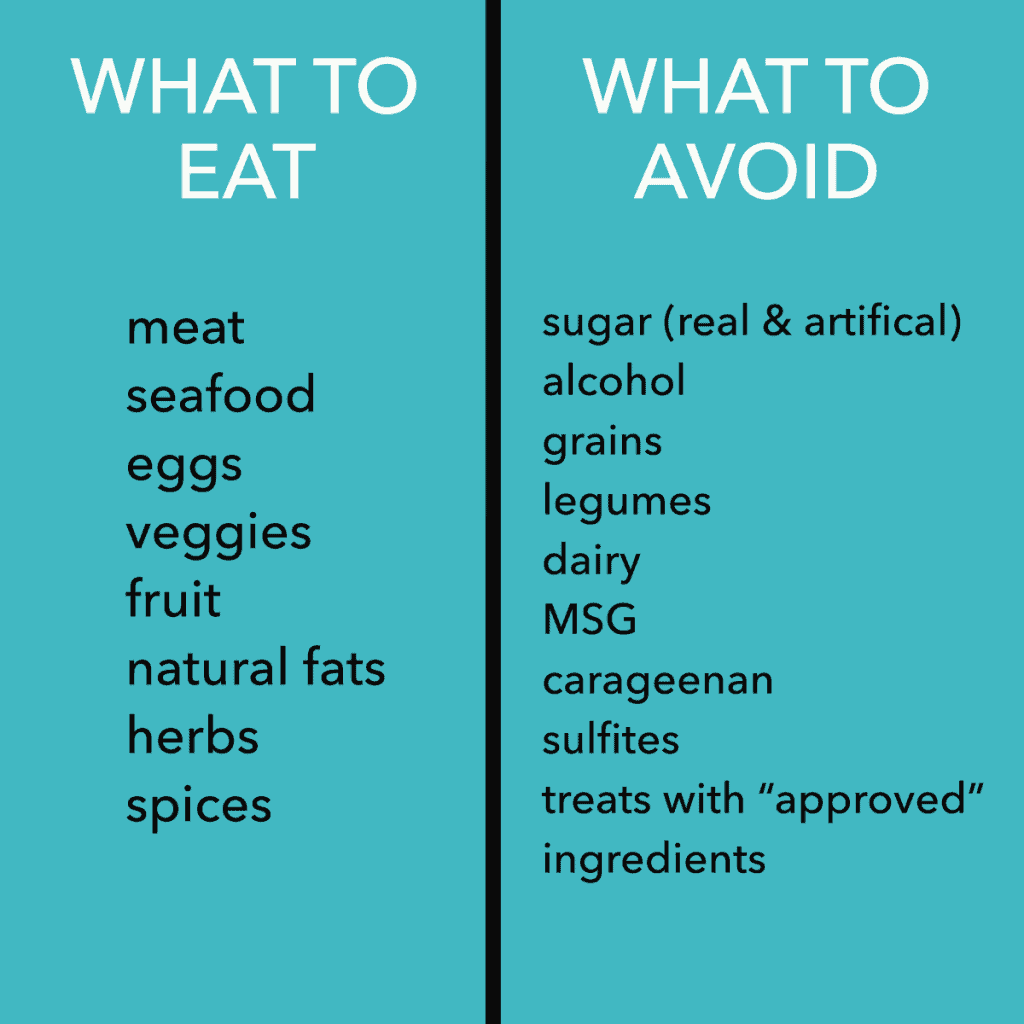
The aim of the diet is to “put an end to unhealthy cravings and habits, restore a healthy metabolism, heal your digestive tract, and balance your immune system.” They promise that the diet will lower chronic systemic inflammation.
However, there’s absolutely no clinical evidence to back up these claims.
Yes, a lot of foods on the “avoid list” are associated with increased inflammation, such as sugar, highly processed foods, and alcohol. Yet, many of the foods on the list have actually been shown to improve gut health and immunity…
- whole grains are associated with decreased inflammation
- yogurt, kefir, and some cheeses contain probiotics which may support gut health and decrease inflammation
- legumes contain fibres and short chain carbohydrates that promote gut health and decrease inflammation
The authors seem to have arbitrarily chosen foods as good or bad, without looking to science. This isn’t really surprising, since they have absolutely NO background in formal nutrition education.
One of the main focuses of the program is to eliminate highly processed foods. The creators even go so far as to say that you shouldn’t try to re-create your favourite treats such as pizza or cookies with ingredients on the approved list.
You might think that, as a Dietitian, nutrition expert, and promoter of healthy eating, I would be totally on board with a diet that seeks to eliminate highly processed foods. I’m not.
Yes, I do want people to rely less on processed foods and prepare more healthy, wholesome, real food meals. Dietitians have (roughly) the same end goal in mind as the founders of the Whole 30. However, I don’t believe the process by which the Whole 30 founders try to accomplish this goal is healthy, or likely to succeed.
Here are six problems this Dietitian has with the Whole 30:
1: the whole 30 is a short term solution to a long term problem
As cleverly coined in the name, you’re supposed to follow the diet for 30 days. I came across a brief mention of slowly adding the restricted foods back in to test for reactions. But, from all the stories people tell about the Whole 30, I get the strong impression that the intention is just to do the diet for 30 days. If you magically changed your habits during that time, you can keep doing it.
Unfortunately, this magic only happens for a rare few. Most people will either…
a) give up before the 30 day challenge is over.
b) feel better or lose weight from having cut out processed foods during the challenge, then go back to their regular habits, gain weight/regain symptoms, feel bad about themselves, and do another 30 days. The weight goes up and down, the body becomes seriously confused, and the person’s metabolism and health ends up suffering.
What works better is to choose ONE thing to change at a time. It’s not as dramatic and doesn’t sound as exciting, but it’s effective. Maybe choose one day a week to try a new recipe. Or decide to cut down on the sugar and cream you put in your coffee by slowly weaning off them. Or switch your morning cereal for something with more staying power like eggs and toast.

2. the whole 30 aims to shame
The authors state that “It could, quite possibly, change the emotional relationship you have with food…” Well, I’m in full agreement, but not in the way they intended. I find it very likely this diet will make your emotional relationship with food much worse.
“This is not hard. Don’t you dare tell us this is hard. Beating cancer is hard. Birthing a baby is hard. Losing a parent is hard. Drinking your coffee black. Is. Not. Hard.”
Well, first of all that’s a blatant oversimplification. Cutting cream and sugar out of coffee is only a very small part of the dietary changes this diet requires.
But so what if I do find drinking coffee black hard? Does that make me a failure? I must be weak if I can’t stick to a diet for 30 days. I can birth a baby but I can’t drink black coffee? How dare I suggest it?
Well, diet changes ARE hard. The evidence is all over the place. There’s no shame in that, contrary to what the whole 30 authors try to make you feel.
Speaking of shame, let’s talk about the “good” vs “bad” food philosophy at the core of the whole 30. When you see food as either “good or bad” you’re drawing lines in the wrong places. With the line drawn at “this food is bad, don’t eat it,” when you finally break down and have a “bad” food, as everyone does, it means you’re doing something wrong. You’ve failed, you’ve crossed the line you’ve drawn for yourself. The result is that you throw caution to the wind, and end up eating way more than you would have if you saw it as a food to enjoy in appropriate amounts!
When you dichotomize food into value-based judgments, it has a strong negative effect on your emotional relationship with food… and with yourself!
When you stick to eating the “good” foods, you internalize those values and start to feel like a righteous, moral, upright, overall good person. But if you slip up, feelings of shame, remorse, and guilt overcome you, and you start to feel like a useless, unloved, devalued, downright bad person.
You might think I’m exaggerating, but I’ve seen first hand that categorizing foods as “good” and “bad” has a profoundly negative effect. Over the years I’ve helped many people develop a truly healthy emotional relationship with food, and often this was at the heart of their codependent relationship with food.
It works at a subconscious level, but thoughts of food can and do become your identity and security, or your source of insecurity.
The reality is that food choices have NO basis in morality. They do NOT define you as a person. You can eat all the crap in the world and it’ll make absolutely zero difference on your worth as a person.

3. the whole 30 is not based on scientific evidence
The authors have cherry-picked foods to eliminate, seemingly based on personal preference, or possibly based on how “evil” they’re currently trending in the world of pop nutrition (I’m looking at you, sugar!). Nutrition As I Know It has done a great job of fact checking the claims in the Whole30 book. Spoiler alert: they’re nearly all false.
The evidence actually shows that….
- MSG is NOT linked to obesity
- Carrageenan is NOT used to induce inflammation in lab rats
- Sugar is NOT addictive
- Organic fruits and vegetables are NOT more nutrient dense
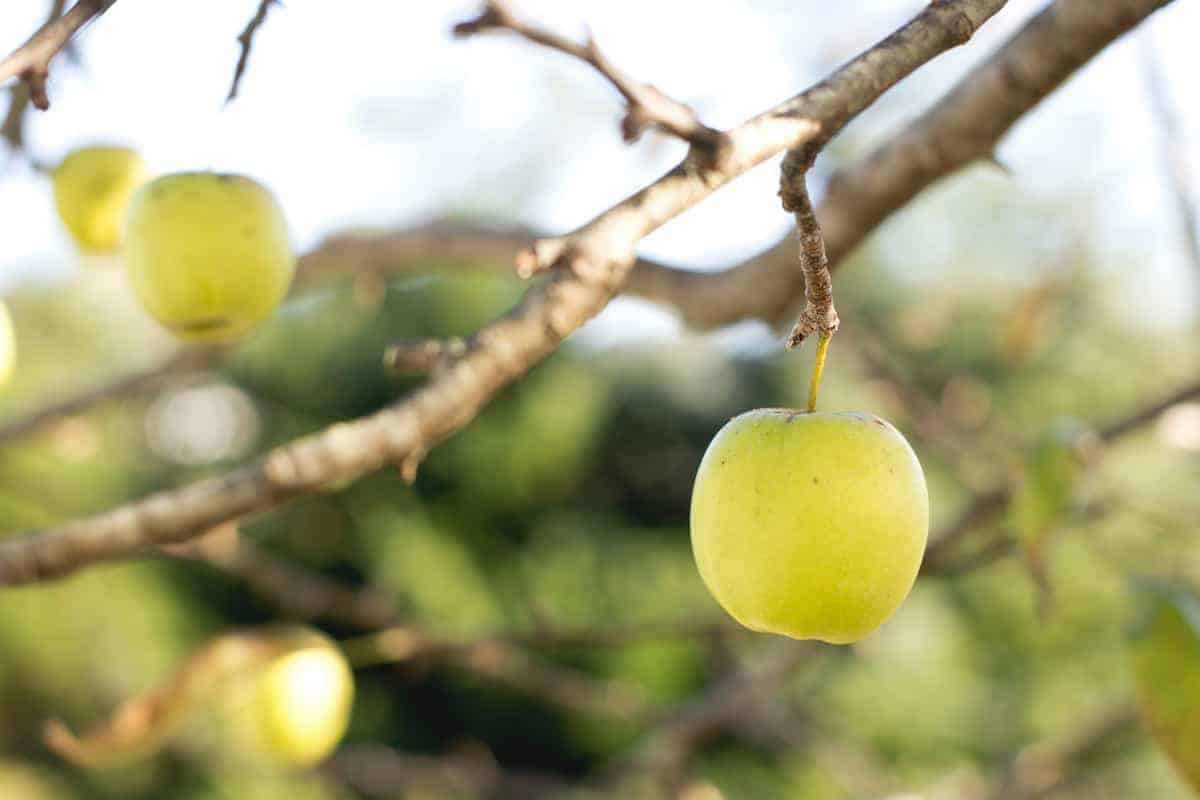
4. the whole 30 is filled with inconsistencies
On their website they say, “Just a small amount of any of these inflammatory foods could break the healing cycle.” So then, why does any of the following make sense?
- No added sugar, but you can have fruit juice, which is basically just fruit sugar dissolved in water. Their explanation is “we have to draw the line somewhere.” So they basically admit that they they are just arbitrarily making up these rules however they want to.
- They warn about the supposed evils of sulphites, but balsamic vinegar is permitted. Balsamic vinegar is a naturally occurring source of sulphites. Maybe nobody told them?
- Legumes are not allowed in the whole 30 diet, due to their phytate content. However, they allow you to eat pumpkin and flax seeds, even though those have a higher phytate content than legumes!
- In 2014 the Whole 30 welcomed potatoes onto the “include” list. Part of their rationale was, “White potatoes are a whole, real, nutrient-dense food! It doesn’t make logical sense to leave them out while other carb-dense foods like taro, yuca, or sweet potato are allowed.” It’s true. But you know what also doesn’t make logical sense? Excluding whole, real, nutrient-dense foods like lentils or barley (which are not allowed) while other carb-dense foods like taro, yuca, or sweet potato are allowed… that doesn’t make logical sense. It would at least follow some logical consistency to ban taro, yuca, and sweet potato instead of allowing white potatoes. I’ve been unable to find an explanation for changing their minds on allowing potatoes, but not other nutrient-dense foods. This Whole 30 list is like a game a toddler made up and keeps changing the rules to suit his fancy. There’s no predictable logic to follow.
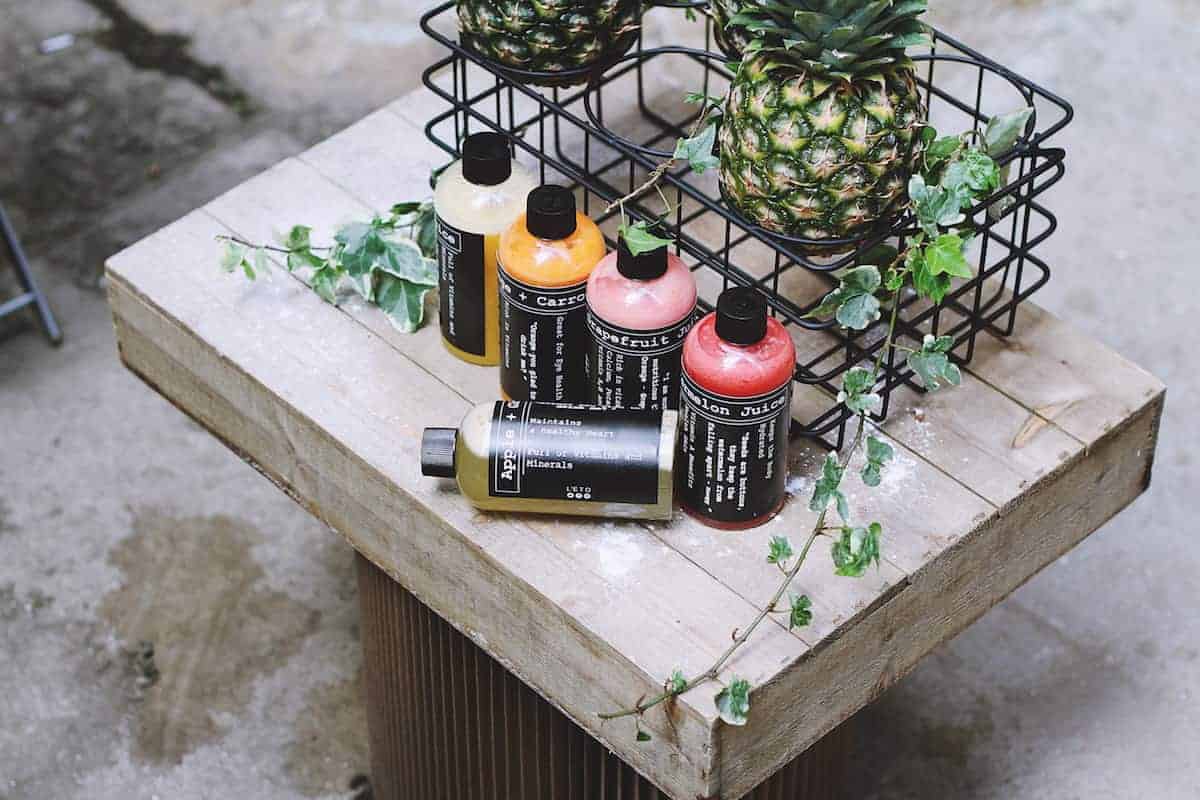
5. the whole 30 sucks the joy out of eating
I think this screenshot speaks for itself….
Cutting out most of the foods you previously enjoyed is going to put a serious damper on your relationship with food. The diet doesn’t even permit you to re-create some of your favourite foods, such as pizza, with approved ingredients. The Whole 30 calls this “sex with your pants on,” abbreviated to SWYPO. This is a polite way of saying “dry humping” I guess?
Since they started the sex talk, let’s run with it and compare your relationship with food to a marriage relationship. You decide you want to improve your marriage relationship. So you make up a list of all the things that bring you joy, and arbitrarily cut out some of them. Dating is no longer allowed. You can go on runs, but no walking. No more sex. Certainly don’t do anything that even resembles sexual activity because that would be SWYPO and that would be fun.
The whole thing is so ridiculous it’s beyond incredulity… none of this is logical at all! Cutting out joy is NOT the way to improve ANY relationship, including your relationship with food.
Since the tagline of my website is “helping you rediscover the joy in eating,” I’m clearly quite passionate about focusing on JOY as the key to healthy eating. How are you possibly going to continue to eat veggies for the rest of your life if you find it a chore or an obligation? You’re an adult and you’re going to make your own decisions. Forcing yourself to eat something you don’t enjoy is just unlikely to happen. If you do, you’re bound to want to reward yourself for the chore by eating something you DO enjoy.
6. the whole 30 is not sustainable for the planet
Legumes, such as lentils, peanuts, and beans are nutrient-dense foods that have a low environmental impact. Grains such as rice and wheat are also crops that are key to feeding the world. The Whole 30 eliminates these in favour of more resource-heavy foods such as meat, fish, and vegetables. The emphasis on organic food only amplifies the unsustainability of the diet, on both the earth and the wallet.
It’s an elitist diet. It’s expensive and it’s not sustainable for the planet or the human race. The whole world couldn’t possible subsist on these foods alone. There wouldn’t be enough food.
Imagine for a second being a part of the population group that is excluded from being able to follow this diet, living on a very tight budget, and then reading an article proclaiming that the Whole30 was the only way to live a healthy, productive life. How incredibly disheartening to feel utterly excluded.
The truth is that people truly can live healthy, productive lives on a low budget diet. But it requires basic staples such as beans and grains, which are not toxic.
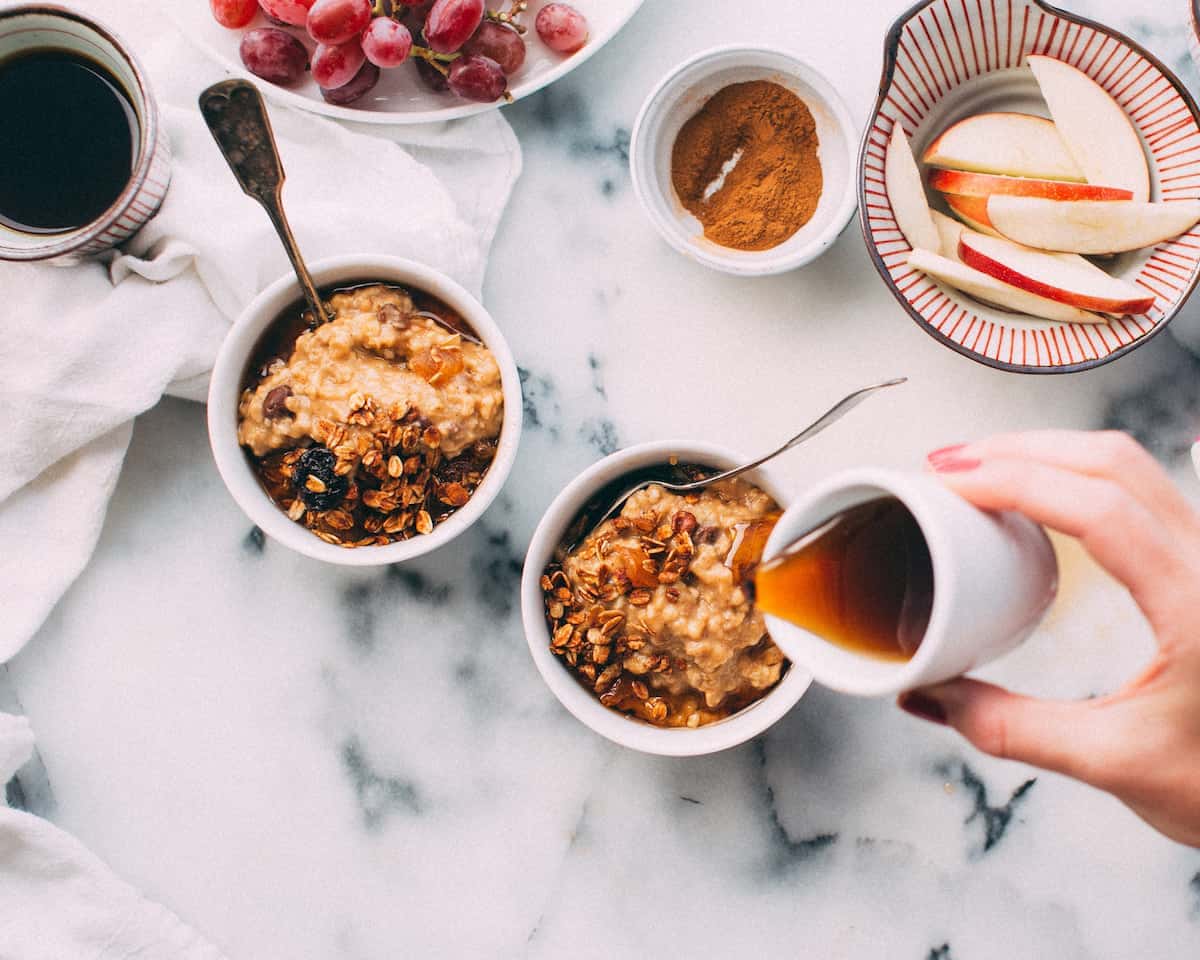
what to do instead of completing a Whole 30
There’s hope outside of the Whole 30! If you’ve thought about or have attempted or have even completed a Whole 30 or a similar type of “clean eating” trend, I know you have good intentions. You just want to eat healthier, right? Or perhaps, despite the authors adamant claims that it’s not a weight loss diet, you’ve heard stories about people shedding a few pounds on the Whole 30 diet, and you’re hoping for the same results. I get that.
I’m here to tell you that there’s a better way. Changing habits is hard. It takes time and it takes changing some mindsets.
The best part? You can have your cake and eat it too 🙂
Read more if you’re interested.
[share title=”Share This Article” facebook=”true” twitter=”true” google_plus=”true” linkedin=”true” pinterest=”true” reddit=”true” email=”true”]

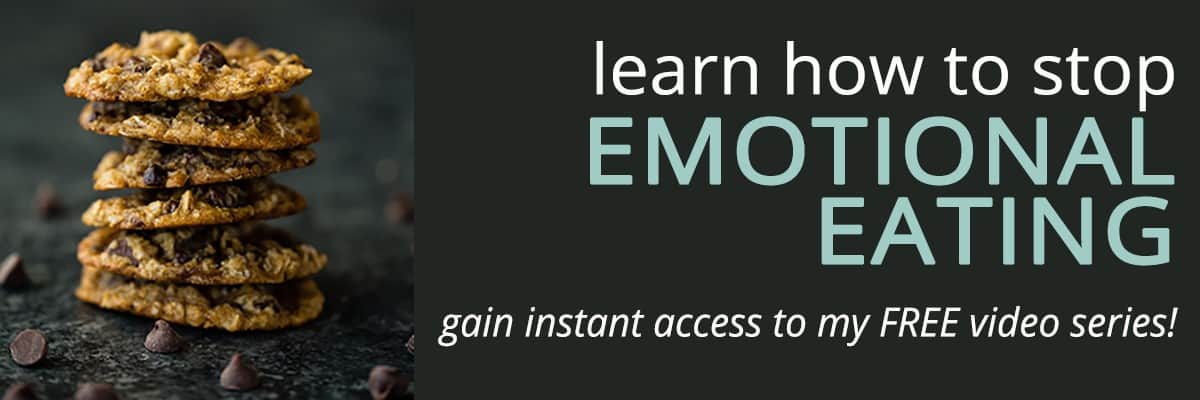
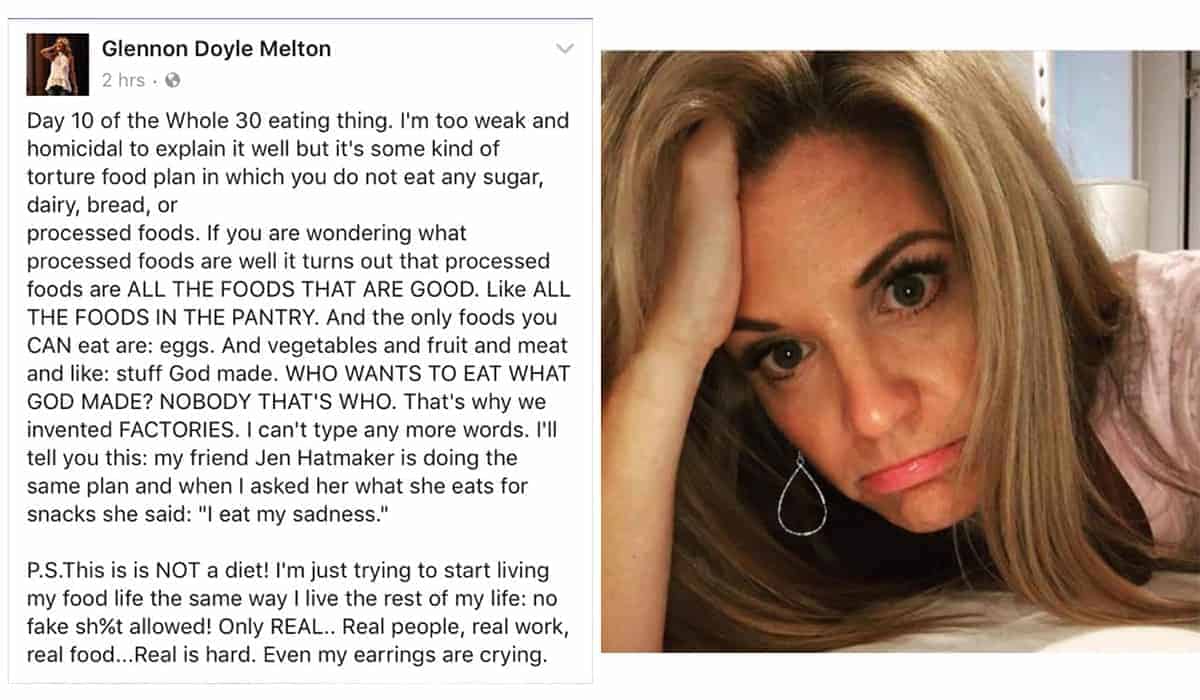

Im studying nutrition, im glad someone finally speak the truth about this trendy diet
That’s so cool! Glad you enjoyed the article!
“It’s an elitist diet. It’s expensive and it’s not sustainable for the planet or the human race. The whole world couldn’t possible subsist on these foods alone. There wouldn’t be enough food.
“The truth is that people truly can live healthy, productive lives on a low budget diet. But it requires basic staples such as beans and grains, which are not toxic.”
Thank you. I’ve lived chunks of time in less-affluent countries and the demonization of legumes and whole grains has always bugged me. Thanks for expressing WHY so articulately.
After reading your review I question whether you really looked closely at the diet, and its purpose.
For one thing, it’s not fair to compare to long term diets, as this is a 30 day program, mainly as an elimination diet. Goal is to find out what foods cause you problems. Weight loss is a benefit but not the main purpose. As one who suffers from intestinal issues, this is allowing me to do a reset of sorts, and will allow me, by adding things back slowly, to isolate what causes me distress. I don’t really care that sugar is not addictive, as you say. I do care that blood sugar spikes cause people to eat more.
You claim the diet allows fruit juice. Not exactly so. It allows a small amount when used as a cooking ingredient. Drinking a tall glass of OJ is absolutely out of the question.
One learns lessons here that can hopefully be applied to eating after reintroduction of the “healthy” foods that you claim W30 wants you to avoid. I’m on day 24, feel better than I have in years, did not experience an “I want to kill everybody” period as I have with other diets, and am fitting into clothes that I haven’t been able to wear in years,
I appreciate your perspective on Whole 30. As a medical professional, I too agree that small changes in the diet are much more easily made and sustained. And I totally agree with your SWYPO comments. Personally, I would much rather people learn to remake their favorite “non-healthy” foods with healthy ingredients than to “dream about” cupcakes or pizza or whatever and eventually overindulge. I do feel though that there is a specific place for Whole 30. I did it along with AIP (autoimmune protocol) for nearly 60 days and did a very slow reintroduction of foods. Through that elimination, I discovered a gluten and peppercorn sensitivity that had eluded modern medicine for several years. In the sense of elimination/reintroduction, I think that Whole 30 can be done very successfully and in that spirit, their hardline “you cannot slip up” attitude is necessary. That being said, someone who is doing Whole 30 for weight loss reasons could totally be derailed and give up after discovering some accidental something in a meal. I believe it all comes down to WHY someone wants to do it and the necessity of taking Whole 30 like everything else in life…with a grain of salt.
I felt to write regarding the Whole 30 as I started the Whole 30 on August 31st 2018 and as of today Nov 12, 2018 I have had REMARKABLE POSITIVE CHANGES FOR THE GOOD!!! Prior to beginning the Whole 30, I had blood tests that were needed due to how I was feeling physically! I am in Post Surgical Menopause for over 2 years and had a multitude of symptoms such as hot flashes, severe joint pain, headaches, very deficient vitamin D, lots of anxiety along with inflammation which caused the joint pain. Back in August my blood work showed high cholesterol ( which I never had before as it has always been on the low side. I was very deficient with my Vitamin D, my Thyroid testing was still in normal range, However, there was a significant change. Being in my later 50’s I was desperate to feel better! My Dr’s office recommended the Whole 30 and I started it the day after my follow up Dr appointment.
A week ago I had the same blood work that was done in August and saw the Dr for the results today! Not only did my cholesterol go down and in the normal range now, my thyroid numbers are great, my vitamin D is normal range ( I did start taking vitamin D in August and my numbers are great now! In addition to my blood work that changed for the better, my joint pain, hot flashes and energy level and anxiety level is way way better since I started the Whole 30!!! I am a living testimony of all the positive results I’ve experienced and am experiencing with the Whole 30!!! I also lost 16 pounds and feel great! The great news is if I can do it, anyone can when you put your mind to it! And the other good news is that I can either stay on the whole 30 and or I can introduce the foods I stayed away from one at a time, as an example I can introduce grains to see how I react and if it doesn’t bother me then I will have the grains every now and then. I can then introduce a little dairy if I want to see how I react, or I can stay away from dairy etc…
Hope this helps someone else out there!!!
I love the Whole 30 and there are fantastic recipes that others share that I’ve tried and it’s great that my husband and son eat better and more healthy too!!!
You should try Whole30, you might change your mind.
What do you think about “The Zone” diet? I tried it a few years back and it was the greatest diet I’ve ever tried. No processed foods, no processed sugar, no excess salt, no grains, beans, or potatoes, just lots of vegetables, fruit, meats and nuts. It really was great and my energy levels were always high instead of peaking and crashing. Surely there are some foods we should avoid?
I think it’s all about the approach and the mindset. I’m a big proponent of tuning into the feedback that your body gives you about the food you eat. So, like you said, when you followed “The Zone” diet you physically felt much better. That’s wonderful! Basically it’s an optimistic view instead of pessimistic: focus on the foods that make you feel good instead of trying to NOT eat the foods that don’t. Does that make sense?
Great review. Keep up the good work.
Thanks for the feedback and encouragement Colleen!
Wow this was a great article on the Whole 30 topic!! Thanks so much for taking the time to share this from a dietitian’s view!
PS: your personality and that bit about SWYPO was hilarious!!!
Thanks for the feedback on the article! I have to give the credit to the Whole30 people for the SWYPO bit…. it was too good of material not to use 🙂
I am wondering what your thoughts are on the topic of organic fruits and vegetables not being more nutritious? My understanding is that antioxidants are created as a denfese mechanism from weeds/bugs. With the use of pesticides/herbicides antioxidants would naturally be reduced.
Good question! In terms of pesticide/herbicide/etc use, organic farming also uses these products. There’s an approved list for organic use. However, one issue that arises is that many of these are less effective than conventional pesticides and therefore organic farmers actually need to use a lot MORE than conventional farmers!
I appreciate your researched based perspective of the Whole30 diet, but your reply to Rachel about organics was not research based. Please read up on “certified organic”.
https://www.usda.gov/topics/organic
I also wrote to a friend of mine who has a certified organic farm. This is what she wrote back about your comment to Rachel.
“I don’t know about other farmers, but the only things I spray are the cabbage family with Thuricide, bacillus thuringiensis, a naturally occurring bacterium found in soils throughout the world. If it gets washed off by the rain, I reapply. And of course potato beetles–I probably spray twice in the season w/the same–once for the adults, and once after the babies hatch. Everything else seems controllable without anything. My tomatoes blight every year but I get enough before the season is done without spraying.”
Thanks for your attention.
Hi Luan, I appreciate that you value research on this topic, and I assure you that the comments I’ve made were based on the fact checking I have done. On the USDA link you sent me, if you follow the links to the USDA organic standards and then click through as far as you can through the “allowed and prohibited substances” for crops, you will eventually get to this page, which is a list of the synthetic substances allowed for certified organic farms. https://www.ecfr.gov/cgi-bin/text-idx?c=ecfr&SID=06b088e611c5f18a4d02ca9945a1c3dd&rgn=div8&view=text&node=7:3.1.1.9.32.7.354.2&idno=7
And this Scientific American article does a good job of explaining why it’s believed that organic farming uses more pesticides/fungicides than conventional farming. https://blogs.scientificamerican.com/science-sushi/httpblogsscientificamericancomscience-sushi20110718mythbusting-101-organic-farming-conventional-agriculture/
So there’s a list of permitted substances but it’s up to each farmer to decide what to use so I imagine there could be a wide variation between farmers. The USDA also has a list of permitted ingredients in foods but each company that makes a food product will use their own formula!